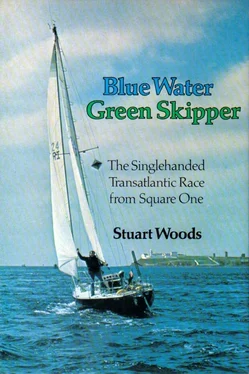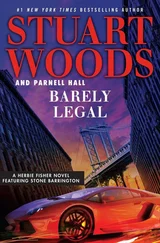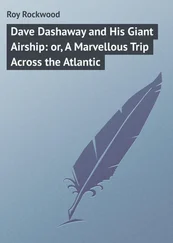That evening Ron, John McWilliam, Nick, and I took Harp out into Cork Harbor. Ron did some tuning on the rigging, and John flung up the spinnakers for the people in the clubhouse to see. It was immensely satisfying and a bit unreal finally to see the boat under sail, even if the only headsail we could set was the light genoa, because the headsail reefing system had not yet been rigged. I would not see much of John on the boat, either. His earlier enthusiasm for the project had now been overtaken by a busy sailing season and a full order book for sails.
Harp returned to her mooring in Drake’s Pool, where she would spend most of her time until the Azores trip. Killian, George Bush’s son, turned up to work on the boat as a freelancer, and things began to pick up. He and Nick began working their way through a list of a hundred jobs. In the rare moments when she was not being worked on, I tried to sail Harp. Finally, on a Sunday afternoon, we left Cork Harbor for the first time, even if only for Oysterhaven, a few miles down the coast. I tried my first single-handed maneuvers, jibing and tacking. On the way back up the river we stuck on the mud once and had to swing the boom out and heel the boat to get off. The passage to Drake’s Pool was a bit dicey at low water. There was a lot of water in the bilges when we got home.
Nick was ill for two or three days, but Killian made progress. He had made up with the yard now, and occasionally George dropped by with a forgotten bit of gear or to do some small job. He investigated the leaking and said the boat would have to go back to the yard for a haulout to be repaired. He also casually mentioned that the nuts on the keelbolts were not the specified stainless-steel ones; the yard had been out of those when Harp ’s keel was fitted. It was depressing to contemplate delivering the boat into the hands of the yard again, but there seemed no other way.
Two weeks to go. Bill King and Harry McMahon came down on Saturday night for a day’s sail on Sunday. We had dinner at the Royal Cork and met a Dutchman, Eilco Kasemien, who was about to set off for Iceland on his wishbone ketch for his OSTAR qualifying cruise.
The day of Bill’s and Harry’s arrival had not been without incident. Killian didn’t turn up to work on the boat, as it was raining. It was spring tide and there was a southeasterly wind blowing, which pushed Harp ’s stern in toward shore. As the tide receded, her rudder grounded on the last bit of a shelf, which was usually underwater. Nick and I rowed out and got as much weight forward as we could to see if she could be floated off. She was stuck fast. We sat in the pulpit with the life raft and the anchor for three hours waiting for the tide to turn. The rudder moved freely when she floated, and we breathed a sigh of relief that no apparent damage had been done.
Sunday morning dawned chill and foggy. Bill, Harry, and I motored down as far as the yacht club and picked up a mooring to wait for the weather to clear. Later in the afternoon we poked a nose into the harbor to find three hundred yards of visibility and foghorns everywhere. We repaired again to Drake’s Pool, having never set a sail. Bill felt, though, that he had at least had a good look at the boat and would not feel quite so much a stranger when we left for England. He and his son, Tarka, a Guards officer in London, would arrive on the twenty-third to help prepare the boat for sailing on the twenty-fifth.
On Monday George came by and we arranged that I would take Harp to the yard on the morning tide on Thursday (it is possible to get over a bar to the quay at the yard only two hours before or after high water). Killian did more work one day and didn’t show on another. A man came and examined me for my radio-telephone license and very helpfully searched out some additional information on billing for telephone calls and telegrams via shore stations. On Wednesday a brief letter arrived from Eve Palmer. She and her husband, Alan, had been among my closest friends in London. Alan and I had worked together as co-creative directors at an advertising agency, and had remained close after we had both left the agency. The letter said, “Dear Stuart, my dear Alan died of a heart attack on Monday, the 7th. Love, Eve.” Alan was a year older than I. I sat in the car in front of the post office and reread the letter for half an hour. Its meaning would not change. I would have difficulty thinking about anything else for days.
On Thursday morning Nick and I motored up the river to the boatyard. Hauled out and perched on a cradle, Harp had that stranded look that all pretty yachts have when they are out of their element.
There was a crack in the epoxy resin which bound the keel to the hull, and daylight could be seen between hull and keel. I left George with a list of jobs to do, told him I had to have the boat back on Saturday, and left.
The day got brighter when the book contract and a check arrived from my publishers, and Joe McMenamin, who had just bought the Lipton’s supermarket chain, promised me some free groceries if an earlier request to the Quinnsworth chain was not favorably received. And a letter had arrived from Quinnsworth saying that they were interested not just in groceries but in sponsorship! Sponsorship was a constant thorn in my side, what with the recession cutting everybody’s advertising and publicity budgets, and this interest helped me to forget for a while the condition of the boat. I rang their offices in Dublin and made an appointment for Monday afternoon to meet with their board of directors to tell them about the project. My mood was further improved by a visit to the yard on Friday, when I found a full crew working away on Harp.
I should have known all this was too good to last. On Saturday morning I arrived at the yard to collect the boat. I had brought my checkbook, as I knew there was another four or five hundred pounds outstanding, and I hoped that, after much pressing, the yard would have the bill ready for me. They had. John Harrington, the office manager, presented me with a bill for something more than £2,100 and told me that he had instructions that the boat should not be put into the water until it was paid in full. I asked if he expected me simply to write a check for that amount without checking over the bill carefully, which would take a day or two, at least. He said that those were his instructions. Barry Burke and his associate Pat Hickey were “unavailable” for discussion of the matter. Steam coming from both ears, I wrote a check for the full amount and dated it for the following Wednesday, so that I would have time to make some arrangements with my bank manager. I collected a bill of sale, the boat was put into the water, and we departed. On the trip back down the river I looked quickly over the bill and saw at least three hundred pounds in overcharges and a great many items about which I had questions to ask, but I would have to go over it with a fine-toothed comb later. At Drake’s Pool Lieutenant Bernard Tofts of the Irish Naval Service was waiting to swing my compasses, a job that took the afternoon.
Sunday we went sailing, and the boat leaked. I went to George’s home in Crosshaven that evening and told him the boat was still taking water. He said there was still something they could do about it with the boat in the water, and he would send somebody to do it early in the week. I told him that if the boat still leaked on the passage to England that I would have it repaired at Camper & Nicholsons and expect Southcoast Boatyard to pay the bill. We were sailing on Friday and had no more time.
Monday morning, on the train to Dublin, I went carefully through the bill. It was, quite simply, full of holes. At one point, when I had been pressing him for a final estimate on the boat, Barry Burke had said to me, “Don’t worry, we’re not going to charge you twelve thousand pounds for the boat.” The cost, in fact, exceeded the estimate Barry had given me when I was considering a custom cockpit, a custom interior, and raising the freeboard of the boat, all of which I had decided against on grounds of cost. I would have a number of questions to ask about the bill.
Читать дальше












